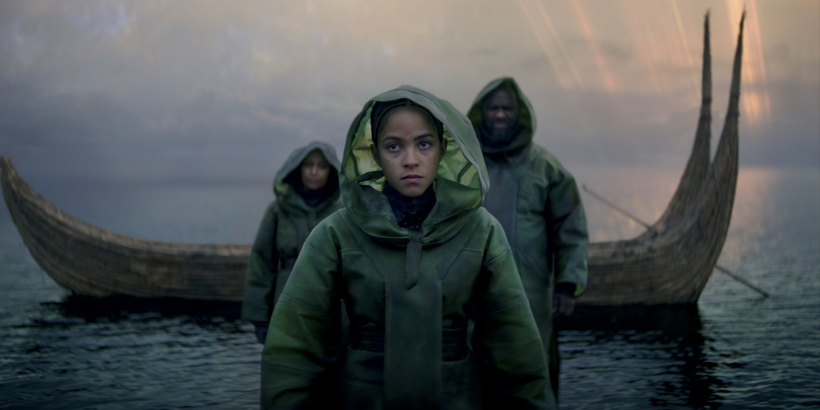The trailer for Foundation, the new big-budget Apple TV+ series adapted from Isaac Asimov’s classic novels, gives off strong and deliberate Star Wars vibes.
As the guru-like Hari Seldon, Jared Harris channels Alec Guinness’s Obi-Wan Kenobi—evidently a British accent will always sound like wisdom to American viewers—while Spanish–South African actress Lou Llobell takes the Luke Skywalker role as Gaal Dornick, the young heroine chosen by destiny. The show’s producer, David S. Goyer, is clearly hoping for a hit on a Lucasian scale; the first season consists of 10 hour-long episodes, but Goyer has said he envisions the story stretching to 80 hours.

As fans of the Foundation books will tell you, however, the influence actually runs in the opposite direction. Asimov’s trilogy of novels—Foundation, Foundation and Empire, and Second Foundation, published in the early 1950s—created much of the template that George Lucas followed in his first trilogy of Star Wars films a quarter-century later.
The original Foundation books—Asimov returned to the series in the 1980s, adding a number of sequels and prequels—tell the story of a band of plucky rebels battling a hulking galactic empire, with the help of a monk-like order possessing ancient wisdom. Asimov took the premise directly from Gibbon’s The History of the Decline and Fall of the Roman Empire, imagining the breakup of a future galaxy-wide empire and the cosmic chaos that would ensue.
But there is also a key difference, which may make Foundation a better science-fiction epic for our times. In Star Wars, a product of the New Agey 70s, the Jedi are mystics who talk in woolly terms about “the dark side” and “the Force.” Asimov, writing at the dawn of the atomic age, believed the future belonged to science, and the heroes of his tale are practitioners of “psychohistory,” an advanced form of social psychology that can accurately predict the behavior of human groups over millennia. The Foundation in the story is a kind of academy established by Seldon, the inventor of psychohistory, to preserve his science during the galactic “Dark Ages” he has correctly predicted are on the way.

The key question in the Foundation novels—as in Asimov’s I, Robot stories, which he wrote around the same time—is whether science can fully comprehend human nature, or if some stubborn remainder is always left over. As the trilogy develops, it explores the paradox of free will. If we learned that our actions were pre-determined, would that knowledge enable us to act differently? Is there any way to change the future Seldon predicted, or do the Foundation’s efforts to do so merely hasten its arrival?

Asimov was a kind of philosopher who used science fiction to carry out his thought experiments, and the Foundation books have long been considered unfilmable because they are more interested in ideas than adventure or spectacle. Fans will be watching to see if the new series can rise to the challenge.
Adam Kirsch is the author of The Blessing & the Curse: The Jewish People and Their Books in the Twentieth Century and an editor for The Wall Street Journal’s weekend Review section

